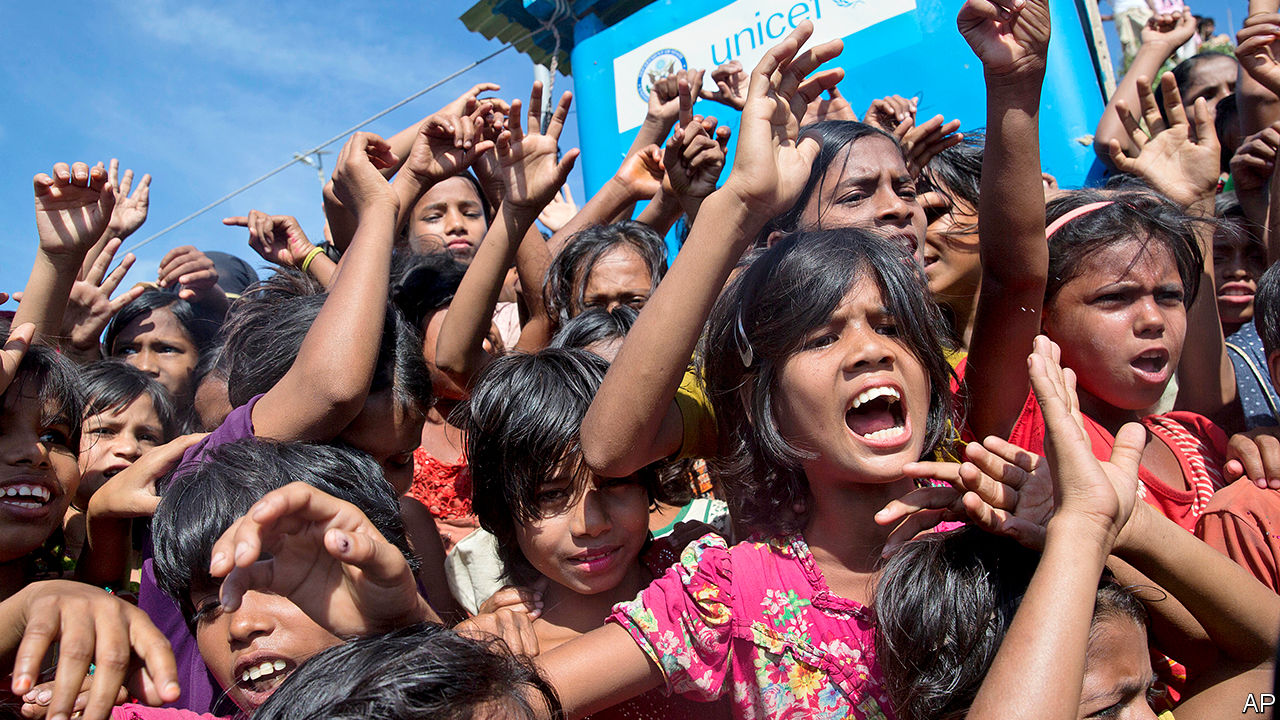
FOR THE Rohingya refugees in camps in southern Bangladesh, it was a frightening moment. On November 15th a line of buses pulled up outside camp 22, in Unchiprang. The Bangladeshi army was there to take the first batch of them back to Myanmar, from where some 700,000 have fled since August last year. But hundreds of the Rohingyas staged protests (some are pictured). They demanded guarantees of citizenship and security before they return. At the end of the day, the buses drove off empty. Bangladesh’s government has delayed repatriation plans for now. The Rohingyas’ future remains as uncertain as ever.
Last month a plan to move 100,000 of them from camps near the port of Cox’s Bazar to Bhasan Char, an island about 30km offshore, was postponed indefinitely. A plan for voluntary repatriation stalled when not a single Rohingya volunteered. On November 18th Abul Kalam, Bangladesh’s refugee commissioner, said the government was still committed to voluntary repatriation. But he also promised a reappraisal after Bangladesh’s general election on December 30th.
A Muslim minority in Myanmar, where they are brutally persecuted, the Rohingyas were last year driven out of Rakhine state, which borders Bangladesh. Myanmar’s army is accused of systematically burning Rohingya villages and torturing, raping and killing the inhabitants. A UN report calls it genocide.
Unlike Rohingyas still in Bangladesh who arrived after earlier waves of repression in the 1970s and 1990s, the latest arrivals have not been given refugee status by Bangladesh’s government. Instead it calls them “forcibly displaced Myanmar nationals”, which supposedly means something different. Building fixed structures in the camps is not allowed, as is anything else that might imply permanency.
At first Bangladeshis welcomed the Rohingyas, but public opinion has turned. Many feel that there are too many of them (around 900,000) to accommodate indefinitely. Hosting them costs Bangladesh at least $15m each year. Ahead of next month’s election, the ruling Awami League is keen to show it is listening to popular concerns. Some speculate that the abortive repatriation operation was intended by the party as a vote-winning stunt.
The ominously named “island plan” has gained popularity. The idea of settling Rohingyas on an island in the Bay of Bengal was first mooted years ago. But Bhasan Char is not an obvious island to choose: formed in the past 20 years, it is prone to flooding and vulnerable to cyclones. (Bangladeshis, including officials, retort that their compatriots, too, lack adequate flood defences and that their lives and property are often threatened by cyclones.)
Aid agencies and human-rights groups have other worries. The island has row upon row of housing and communal ponds for fishing. But it is not clear how the Rohingyas would make a living there, or how they would fit in. The island is too small for all of them to live on.
Repatriation is even harder. The UN has warned there is no plan in place to ensure effective monitoring of how those who return are treated. Nor has the situation in Rakhine state changed much in the past year. Tens of thousands of Rohingyas in the state are still confined to detention centres. Myanmar’s government still does not accept the Rohingyas as citizens. It has offered no guarantees of their safety.
The Rohingyas are understandably reluctant to return. Before the planned repatriation attempt, many of the 2,200 on a list approved by the Myanmar government fled their shelters and hid in other camps or the nearby forest. Aid agencies note that, ahead of the exercise, fewer refugees used their services, fearing that registering for these might cause their names to be added to repatriation lists.
“We won’t be going back,” says Hamida, a 47-year-old Rohingya, pointing out that if those in Myanmar are still not being allowed identity documents, they have little hope of getting them. The UN’s refugee agency has made clear that any repatriation must be voluntary. But many fear Bangladesh’s government will not wait for ever for the Rohingyas’ consent—especially since the aid money that sustains them is running out. The UN is trying to raise $951m to support the Rohingyas. So far it has nearly three-quarters of that. But the patience of the outside world with the Rohingyas’ plight is not to be relied upon.








